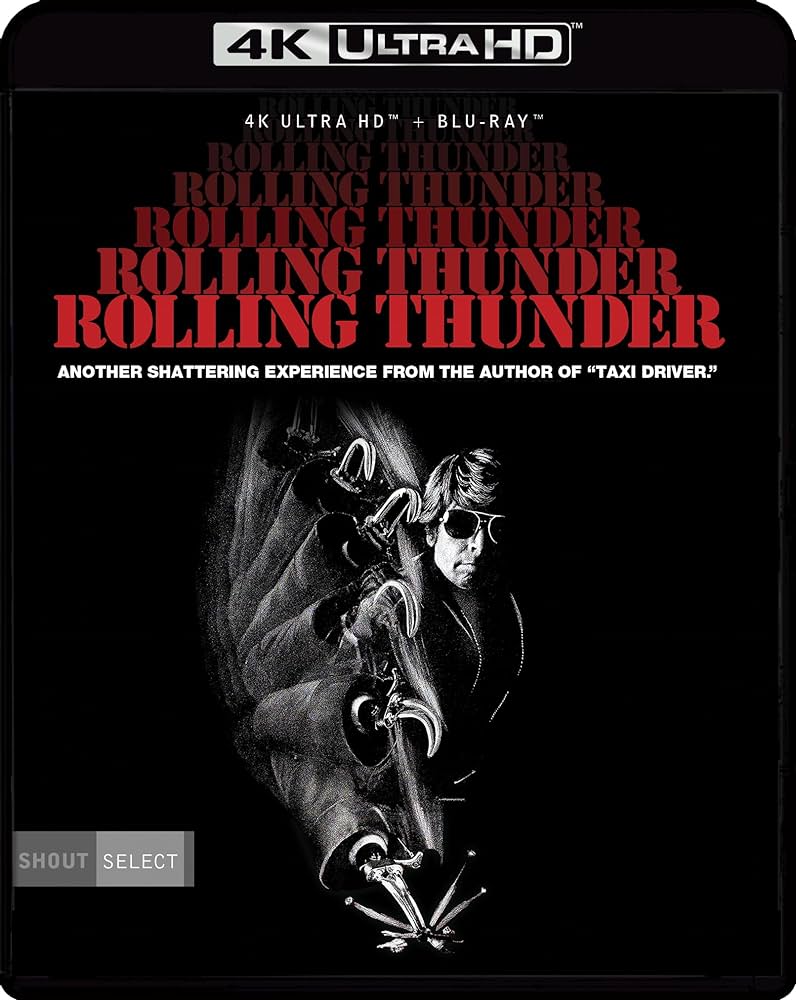Major Charles Rane (William Devane) is a returning hero, having finally been freed from a POW camp in Vietnam where he endured terrible experiences that pushed the limits of human endurance. Back on American soil he is reunited with his family but feels ill prepared to ease back into family life. To make matters worse, he discovers that his wife has had an affair while he was gone and his son barely knows him anymore. This familial unrest turns out to be small potatoes compared to the hell into which Major Rane finds himself thrust when a group of crazed thieves break into his house looking for a crate of silver dollars that Rane was gifted for his service. When Rane proves less than cooperative they shove his hand into the garbage disposal and then proceed to murder his wife and child, leaving him for dead. But Major Charles Rane recovers, at least in body. With the help of his similarly disaffected friend Johnny who had also been in Vietnam with him, Major Rane will get his revenge on those who destroyed his chance at normalcy.
Rolling Thunder is one of those beloved classics of the revenge-o-matic genre (as Quentin Tarantino would refer to it) that blew up in the wake of Death Wish. Does it deserve it’s cult classic status? I certainly think so. Rolling Thunder is about as lean as you can get for a revenge flick due in large part to John Flynn’s deceptively sure hand behind the camera. The film hits all the necessary beats with very little padding. This spare approach is I think largely a result of Paul Schrader’s original script. It sounds like from the extras that it was even more straightforward and stripped down than what we ended up with. After Heywood Gould was brought on,based on his comments in the extras, he contributed much of the emotional drive of the film, more scenes with Rane and Linda Haynes’ waitress character and scenes with Tommy Lee Jones’ character of Johnny and his family. While I can see why we have Rane’s relationship with the waitress (I think the film needs to show how emotionally cold he has become), it does feel like there are one or two scenes too many. I think the additional family scenes with Johnny actually help the film though, showing how uncomfortable he is trying to ease back into domestic life. The way he leaps at the chance to join Rane in the final bloody gunfight is a very smart way of showing without telling. Tommy seems genuinely eager, with almost a sense of relief at going once more back into combat. Speaking of the acting, Devane and Jones are both excellent in these roles, subtle and controlled with characters that could easily have teetered into self-parody in less capable hands (see Death Wish 3 for one of the more ludicrous examples).
Shout’s new 4K transfer looks excellent, a big jump in quality over the previous blu-ray release, with a very clean and natural image and a nice balance of grain. This feels about as close as you could get to watching it when it was released new in the theater, if not even better. The audio provided is a solid but unremarkable DTS-HD Mono track. It gets the job done. For this new 4K release, Shout has produced several new extras including two new audio commentary tracks. The first is a commentary with screenwriter Heywood Gould and film historian C. Courtney Joyner. This one is good for getting a lot of anecdotes surrounding the making of the film and Gould’s career in Hollywood. It does have some empty moments but not too many. The second track is with filmmakers Jackson Stewart and Francis Galluppi, and it’s clear that these guys are genuine fans of the film. This is the track to listen to for lots of scene-specific comments, detailed trivia and explanations on what makes the film so great. Additionally we have a couple of new featurettes. The first “Lean and Mean: The Early Films of John Flynn” has C. Courtney Joyner giving a nice overview of the first several films of director Flynn before his ventures into Hollywood action films like Stallone’s Lock Up and Segal’s Out for Justice. Joyner is very articulate on why Flynn is an underrated director worth reappraisal. The other new extra is an interview with Barry De Vorzon, the composer of Rolling Thunder. I didn’t mention the score earlier but the sparseness and intensity of it is one of the reasons that the film works, and De Vorzon discusses the reasons why he chose to pair the film with its icy synth tones. Additionally we have an archival “Making of Rolling Thunder” featurette that offers, along with comments from actors Devane and Jones and with writer Gould, Paul Schrader’s thoughts on the film. It’s clear from his comments that the film did not turn out how he envisioned it. Now whether the movie is better or worse because of that, I think that’s debatable. We also get a Trailers from Hell with Eli Roth discussing the movie. TFH shorts are always fun, seeing how others in the industry appreciate a film.
Rolling Thunder is indeed one of the greats in the revenge thriller sub-genre, and Shout has given it a great release that will be sure to please all the fans out there who have been looking for a 4K upgrade.

